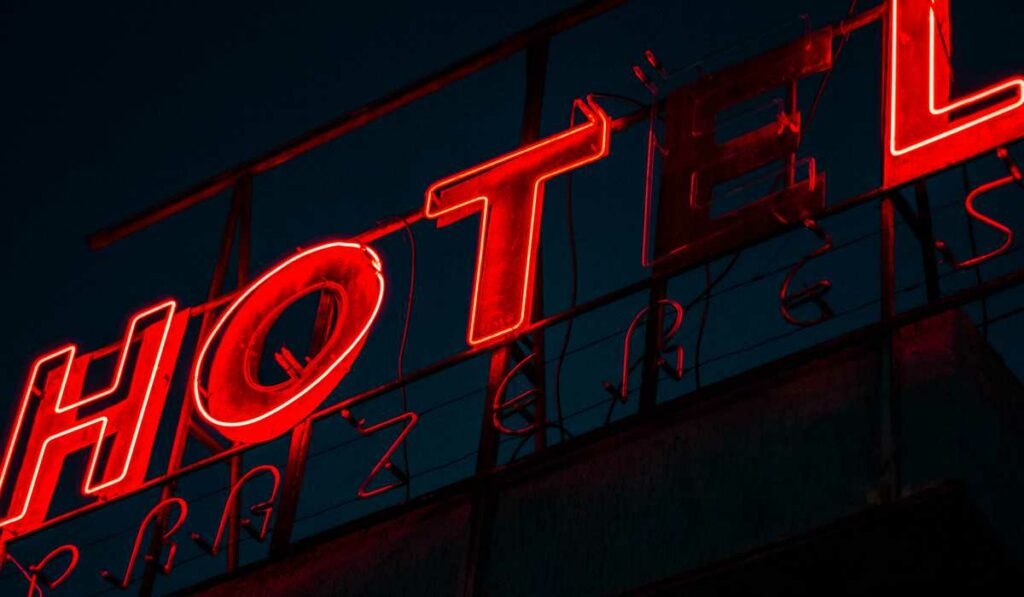Hotel chargebacks are a considerable problem for most businesses, particularly for hoteliers. Not only can they significantly impact a hotel’s bottom line, but they can also affect a hotel’s ability to process payments in the long run.
While the intent of chargebacks is to protect consumers, vendors need to understand how they work if they want to protect themselves from fraudulent hotel chargeback attempts. Which is what you’ll learn here.
In this article, you’ll learn about chargebacks in general and how they work, including hotel chargebacks in particular, and how you can dispute them.
What Are Hotel Chargebacks?

A chargeback is a transaction reversal triggered by a customer’s bank after the cardholder disputes a charge on their card. It is a word that strikes fear into the hearts of all those in e-commerce. It differs from a refund in that a refund is normally initiated by the service provider rather than the bank.
A hotel chargeback protects the cardholder from dishonest merchants and unlawful transactions. It is an unwelcome and often unexpected danger to a company’s revenue. While there might be somewhat different reasons for hotel chargebacks, they are functionally the same as any other chargeback.
Who Is a Part of the Chargeback Cycle?
The chargeback procedure involves more than just the cardholder and the hotel. All of the parties involved are listed below:
- The card’s owner
- The card issuer (the card owner’s bank)
- The card brand (Visa, Mastercard, Amex)
- The hotel’s merchant services provider
- The hotel
How long does it take to process a chargeback?
Chargeback issues typically take some time to resolve. This time is mostly determined by the card networks, each of which has slightly varied rules and timelines.
Typically, a cardholder can initiate a chargeback within 120 days of the transaction date. It takes 60-75 days to receive a decision after giving proof for the issuing bank to consider. The bank’s decision is final and cannot be challenged directly with them.
What Are the Most Common Causes of Chargebacks in the Hotel Industry?

Hotel chargebacks are initiated by guests that don’t agree with a charge on their card. The cardholder should inform their bank of the reason, which is communicated to the vendor in the form of a reason code.
Some of the most common chargeback reasons include:
- The customer is unaware of the charge on their account; Because they were dissatisfied with the service offered, the client wants to avoid paying for lodging or services.
- The customer has forgotten about a specific purchase: Another household member may have made the purchase with their card and is unaware of the transaction.
- The customer refuses to pay the cancellation/no-show fee.
- Card fraud – using stolen cards or testing card restrictions
The majority of hotel chargebacks that come through a merchant are classified as “Fraudulent,” but only a small minority constitute true fraud. The vast majority of these losses are classified as “friendly fraud,” in which the cardholder does not recall the transaction and just requests an explanation.
Resolving hotel chargebacks
Once you understand the reason code connected with a chargeback, you may determine the root cause of the dispute and send a response that includes the necessary compelling information to increase your chances of winning the case. If a guest files a chargeback for a no-show fee, the reason code will indicate that it is for a no-show, and you will be able to give proof that the visitor did not appear and that they were made aware of the fees for not showing up for their reservation in advance.
Understanding chargeback codes can help firms understand how to avoid them in the future, as well as what needs to be addressed in terms of procedure – and how to achieve it.
How to Challenge a Hotel Chargeback
During the chargeback dispute procedure, both the cardholder and the merchant attempt to demonstrate that the other is incorrect by giving evidence. If you do your investigation and submit appropriate evidence to oppose the claim, you have a good chance of winning the dispute.
You should also know that your service provider will most likely impose a fee for the dispute process. You might get the fee back if you win the dispute, but not if you lose it.
Let’s go over how hotel chargebacks are handled step by step:
The cardholder contacts their financial institution
The cardholder notifies their issuing bank and informs them that they wish to dispute a certain transaction.
The claim is reviewed by the issuing bank
The supporting papers and the cardholder’s statement for why they believe the transaction is fraudulent are reviewed by the issuing bank. The bank then determines whether to accept or reject the cardholder’s evidence.
The chargeback is received by the acquirer
If the cardholder’s bank determines the charge to be valid, it contacts the acquirer and withdraws the disputed amount.
The chargeback is received by the merchant
The acquirer will then send a claim to the merchant or service provider. The merchant has two possibilities from here:
- Accept the chargeback, and the cardholder will receive a reimbursement.
- Defend the charge by presenting supporting evidence.
If the merchant believes that the chargeback is unreasonable after evaluating the case, it is their job to submit compelling proof to the acquirer and issuing bank.
The evidence is delivered to the acquirer
The acquirer is the first party to receive proof from the merchant. If they believe the evidence is sufficient, they will forward it to the issuing bank.
The issuing bank obtains supporting documentation
The issuer has two options after reviewing the proof presented by the merchant:
- Accept that the merchant made a valid charge and request that the cardholder withdraw their claim and repay the disputed amount to the retailer.
- Accept that the cardholder is correct and resolve the issue in their favor.
Mediation
If the vendor or the cardholder is still not satisfied with the result, they may seek further mediation. In this case, the evidence is sent to the card network and they judge who deserves to win. The card network’s judgment is final and cannot be appealed.
How to Prevent Chargebacks
The bad news is that some hotel chargebacks are unavoidable, if only because people are reluctant to part with their money. Furthermore, it is frequently faster (and less contentious) for a consumer to call their bank and request a chargeback than it is to contact the property directly to discuss a refund.
Nonetheless, there are proactive steps you can take to reduce the possibility of hotel chargebacks:
Use a Clear Payment Descriptor
When a cardholder looks at their bank statement, they should be able to identify the purchase they made right away. Use parent company names and abbreviations that only you understand.
Make certain that your payment and refund procedures are properly communicated to customers – and that you can demonstrate them
If the client disputes your rate policies or anything else for which they may have been charged, your best defense is to demonstrate that the customer approved the rate’s terms and conditions when submitting their reservation and that they received a confirmation email that reinstated these terms.
For example, if a guest refuses to pay the no-show/cancellation fee and claims to the issuing bank that the policies were not communicated, you should specify that all of the channels through which you sell rooms have clear cancellation and refund procedures and that this information is reiterated on all confirmation emails.
Communicate with the client
Credit cards are typically kept on file and then charged retrospectively for additional services or costs, and because the consumer has already left the hotel, they will have no idea why or for what they have been charged.
For example, a guest left the hotel and was charged for minibar products and room damages. If the card was charged without first speaking with the consumer, the cardholder will almost certainly file a chargeback.
Why are Chargebacks So Important to Hotels?
When a hotel visitor lodges a dispute with their credit card company or issuing bank, a chargeback happens. The dispute could be prompted by a variety of factors, such as their card being charged twice, or the guest and/or card processor identifying fraudulent purchases made with the card in question.
Regardless of the trigger, the cardholder’s issuing bank and the merchant’s bank will investigate the claim after it has been filed. The bank will credit the visitor for the amount until the chargeback is settled.
When a chargeback is issued and the issuing and receiving banks are unable to resolve the disagreement, the receiving/acquiring bank will tell the merchant (hotel) of the chargeback, which the property can then accept or contest.
If the hotel contests the chargeback, it must resubmit the charge to the acquiring bank, along with supporting documentation. The visitor may also be required to present evidence. After that, the issuing bank will review the matter and make a decision.
It’s an issue that hotels would rather avoid for a variety of reasons. When a consumer raises a dispute, regardless of the merits of the chargeback, the hotel suffers in various ways:
- It has an impact on a hotel’s bottom line: Chargebacks frequently cause the most damage in the form of money lost to the hotel from guests who stayed at the resort but afterward contested the charge.
- It’s not easy for hotels to deal with: Disputing chargebacks is an extremely comprehensive, specific, and time-consuming process. Chargebacks are typically investigated by a hotel’s finance/accounting department, diverting them from other work. These departments require as much information as possible for their hotels, thus having an audit trail at their disposal becomes critical.
- Hotels frequently do not know what information to gather and provide: Manually combing through audits, receipts, and paper trails to contest a chargeback can be difficult and time-consuming. Multiple efforts may be required to meet the processor’s documentation requirements.
- Hotels may be unaware of chargebacks: Learning about a chargeback isn’t always easy. Hotels are not always notified, and it is difficult to tell when a charge is being disputed. It’s already a problem by the time it gets to the merchant. You want to be able to deal with these chargebacks before they reach the vendor.
How Hotels Are Fighting Chargebacks
Many people believe that resolving the reporting and evidential requirements of chargebacks is part of the process where hotels can acquire more influence and control. Clearly, relying on technology is the key to making this project a reality. Instead of clogging up your accounting personnel with receipts, an automated method can handle these events promptly and properly.
The potential solution comes from an unexpected technology sector: Some suppliers of digital check-in/keyless entry are already including chargeback dispute capability in their systems. Why? Because these technologies may have a better understanding of your guests’ unique actions on your property than you do.
Mobile contactless hotel check-in and keyless entry solutions can also protect your property from fraud and chargebacks. The primary advantages are as follows:
- These systems may not be able to determine every detail of what the guest did during their stay, but they can confirm the guest was present at the hotel and remained in the guestroom. This is especially important when a customer says they never visited the property during a chargeback dispute.
- In the event of a chargeback, contactless hotel check-in and keyless entry systems can provide a complete audit trail while instantly reporting the audit information to the vendor handling the dispute.
- The automated system notifies vendors and clients, allowing the situation to be managed quickly and proactively rather than delaying the process while waiting for multiple parties to reply.
- Reporting also provides the hotel with updates and paper trails for future reference
By removing the chargeback load from the accounting and finance departments, the anti-chargeback automation strategy contributes to the hotel’s bottom line through successful chargeback disputes and increased labor productivity. This strategy tends to pay off if you can save a few reservations each month.
Final Thoughts
Hotel chargebacks are no different than any other type of chargeback, as it’s just a customer asking their banking institution to reverse a fee. The problem is how these chargebacks can affect hotels, threatening not only their revenue but also their merchant accounts. One of the best ways to deal with these nuisances is to implement a system that can help hotels track their stay (with check-in and room access information), giving them the evidence they can use to support their case.

